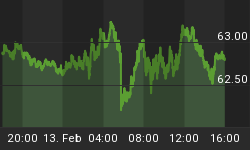Current Situation - The absurd money-creation continues. Slowly yet surely, the "stealth" confiscation of savings is gaining momentum as money loses its value. Central banks claim that they are raising interest-rates to fight inflation. At the same time they are slipping in more rum into the punch bowl, thus creating just what they say they want to fight - inflation! Take a look at the latest year-on-year money supply growth-rates around the world:
Australia + 9.1%
Britain + 11.7%
Canada + 7.7%
Denmark + 14.7%
US + 8.1%
Euro area + 7.3%
When I glance at these mind-boggling figures, at least I don't see any monetary tightening taking place! Make no mistake, this excessive liquidity is inflation that banks are creating and this inflation is destroying the purchasing power of your hard-earned money. As asset-prices continue to benefit from this monetary insanity, the wealth inequality is getting wider resulting in social unrest in several parts of the world. The ultimate truth about inflation is that it always benefits the rich who are able to ride the inflationary wave by investing in assets, whereas the poor become even more impoverished as things continue to become more expensive.
So far, the ongoing inflation has been masked by the bogus core inflation figures released by the authorities. According to the official statistics, inflation is tame and under control. But if you take a look around, you will realise that the cost of living is rising much faster than the officials would have you believe. The cost of energy has gone up six times; the cost of housing is at a record-high in most countries; education is ridiculously expensive and insurance premiums are soaring. And we should believe that inflation is not a problem? If inflation is really not an issue, why has the Federal Reserve decided to stop publishing the money supply (M3) growth rate as of the next month? For sure, the prices of consumer goods (televisions, computers, clothing etc.) have come down in recent years due to vast improvements in technology and the economies of mass production, but the overall cost of living is rising rapidly due to inflation as there is too much money being created.
At a human level, inflation is a tragedy and totally immoral. However, we all have to work within the system and protect our assets as best as we can. It has become obvious to me that the central banks will continue to inflate the supply of money (inflation). The Federal Reserve came into power in 1913 and with the exception of the Great Depression that occurred in the early-1930's, we have experienced inflation and nothing but inflation every single year! Put simply, the US money supply has increased every year over the past 70 years! Figure 1 clearly demonstrates that inflation has prevailed for a very long time. Moreover, most of this inflation has taken place after 1971 when gold was removed from the monetary system.
Figure 1: The constant inflation program!
Source: www.economagic.com
The point I am making is that under the present monetary system inflation is a constant. What changes though, are the rates of inflation (money supply growth) in various countries and the sectors of the economy that benefit from inflation. For instance, during the 1970's, commodities were the main beneficiaries of inflation and financial assets lost out. However, in the following two decades, it was financial assets which were the biggest beneficiaries of inflation. Since 2001, this excess liquidity has (once again) started flowing into commodities as can be seen from the recent massive gains in tangibles relative to gains made in financial assets such as stocks and bonds.
There is another crucial point I'd like to make. During highly inflationary times (such as now), the purchasing power of money declines against all asset-classes. In other words, if enough money is printed, despite a horrendous economy, stocks, bonds, property, commodities as well as collectibles may all rise at the same time. Such a rise in asset prices due to high inflation gives the ILLUSION of prosperity. Nothing can be further from the truth however. Hyperinflation almost always leads to a collapse in the inflating country's currency relative to other major world currencies. Now, if all the countries decide to print money (inflate) at the same time, which seems to be happening now, instead of declining against each other, the various currencies may decline against assets. So as investors, we need to try and figure out which assets are likely to appreciate the most due to inflation.
Puru Saxena produces Money Matters, a monthly economic publication, which highlights extraordinary investment opportunities in all major markets. In addition to the monthly reports, subscribers also benefit from timely and concise "Email Updates", which are sent out when an important development in the capital markets warrants immediate attention. Subscribe Today!
















